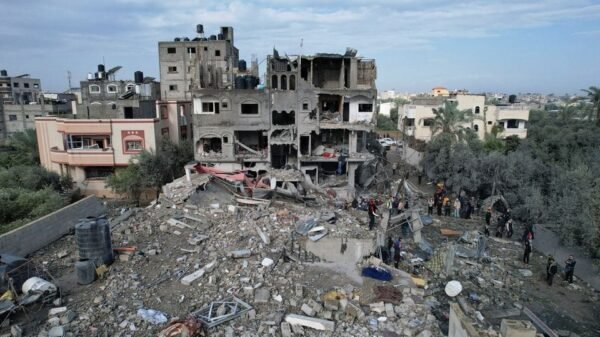Israeli Residents Regret Evacuation
Ayelet Kohn and Shachar Shnurman harvested grapefruits this month – a defiant act of normality amid the burnt-out remains of their neighbors’ homes.
The couple, who reside in Kibbutz Kfar Aza, situated just 2 km (1.2 miles) from Gaza, were among the first targets of coordinated attacks by Hamas gunmen on October 7. These attacks, which killed around 1,200 people in southern Israel and took more than 240 hostages, prompted the evacuation of the community in the days following the events.
Ayelet and Shachar, however, have returned and are the first to move back into Kfar Aza. They live in a kibbutz that has become a kind of museum, frozen in time on the day of the attack, with burned and broken houses left untouched. The kibbutz is now visited by various groups during the day, including new army recruits, potential donors, journalists, and humanitarian organizations.
However, the couple often finds themselves alone in the evenings, with a stark contrast to the past when people would walk along the road to say hello. The shock of October 7 is still fresh for many residents, and the ongoing war in Gaza is visible from the kibbutz border fence.
Ayelet points to her next-door neighbor’s house, emphasizing the personal impact of the attacks. “Our next-door neighbor, who was a very good friend, was murdered,” she says, and it serves as a constant reminder of the tragedy.
So far, Ayelet and Shachar are the only members of the kibbutz to move back full-time, and the challenge for the Israeli Prime Minister is to restore a sense of security in the country’s displaced communities. The costs, both political and financial, are rising, and the empty border communities serve as a daily reminder of the failure to protect. The couple hopes that changes will occur, suggesting that the army’s organization, the government’s dealings with Palestinians, and the global approach to the situation may need to evolve.
Prime Minister Benjamin Netanyahu has emphasized that only “total victory” in Gaza and the destruction of Hamas as an organized force will provide future security for Israel. However, the ongoing war has raised concerns, with growing pressure to agree to a ceasefire deal to ease Gaza’s suffering and release the hostages still held by Hamas. The couple has hung a large black flag from their veranda in solidarity with the hostages, 19 of whom are from Kfar Aza.
As the war continues with no clear plan for the day-after in Gaza, the question of how to repair a sense of security on Israel’s northern border is more fraught. The residents of the northern communities along the Lebanon border are also experiencing difficulties, with increasing pressure to return residents to Israel’s frontiers.
The challenge lies in how to restore a sense of security, especially as the costs of displaced communities rise, both politically and financially, month by month. The ongoing war in Gaza has brought into sharp relief the contract in Israel’s border communities, where residents traded a red alert siren once a week and a missile once a month for the best quality of life at a low price. Now, with the risks higher and the potential for a massacre, the need for a clear resolution is evident. The hope is that lessons have been learned and measures are taken to ensure the safety of these communities in the future.




















































Comment Template